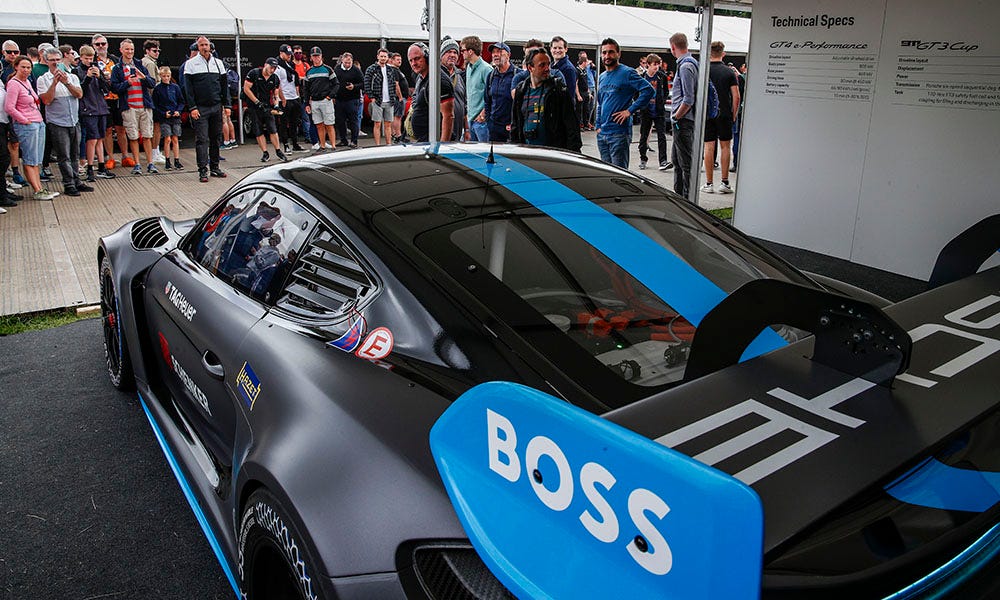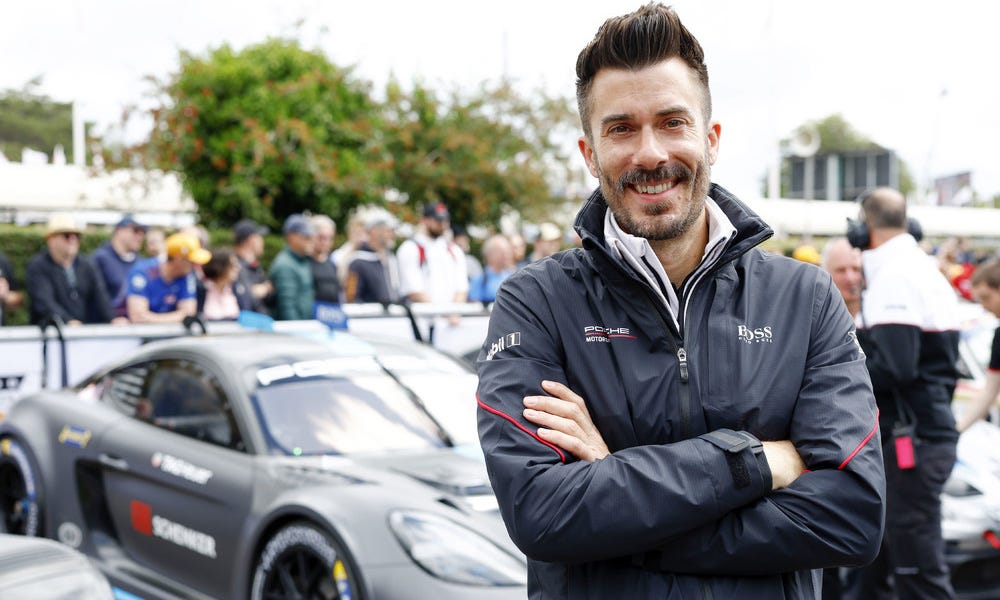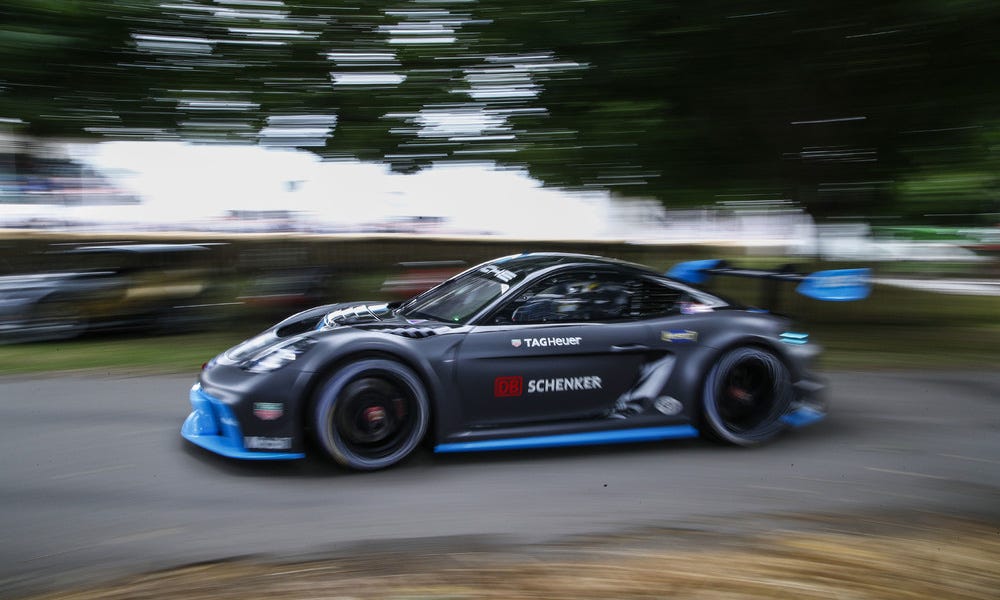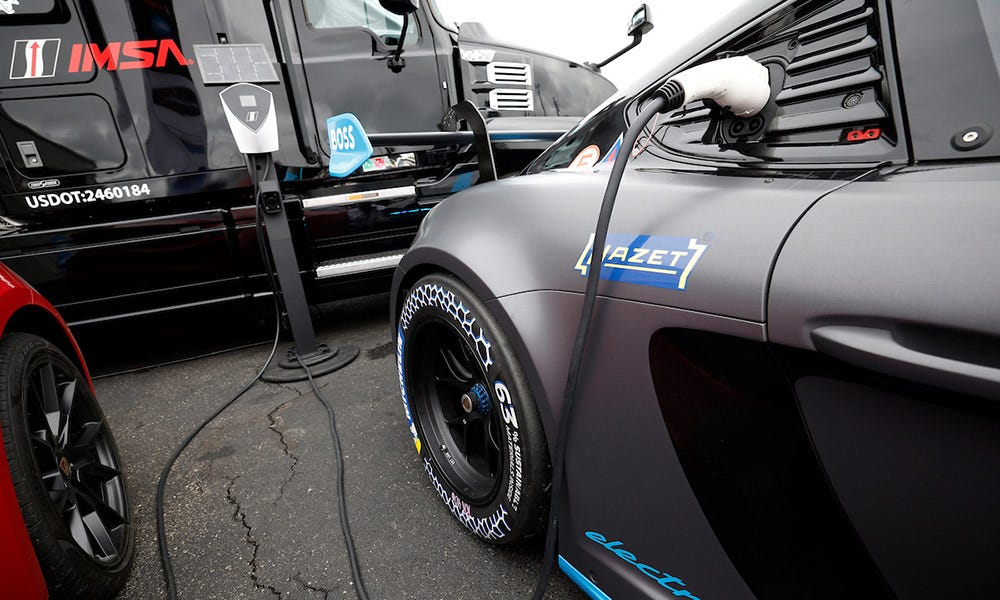Insight: How Porsche is Preparing for an Electric Future
John Dagys takes a look into Porsche's GT4 e-Performance EV racer, which could pave the way for a future all-electric single-make series...
From the all-electric Taycan to its involvement in the ABB FIA Formula E World Championship, Porsche has been one of the leaders in preparing for an electric future, not only in high-performance production cars but on the race track as well.
While having launched the Porsche Mission R race car concept in 2021, the German manufacturer has taken things one step further with its latest EV racer, the Porsche GT4 e-Performance, which has been on a world tour as part of a multi-faceted approach.
The 800 kW (1,088 horsepower) machine, initially based on the Porsche 718 Cayman GT4 RS Clubsport but made 140 mm wider, recently made its U.S. track debut at Watkins Glen International during the Sahlen's Six Hours of The Glen weekend, with Klaus Bachler and Joerg Bergmeister at the wheel.
It wowed fans with several demonstration runs on the historic 3.4-mile circuit in upstate New York, providing a potential glimpse into Porsche's single-make series future.
As Porsche GT4 E Performance Tour project manager Oliver Schwab explains, the goal of the project was to develop a race car that could meet the performance targets currently seen in Carrera Cup or Mobil 1 Supercup competition, a series that utilizes the ICE-powered 911 GT3 Cup car.
"Looking at what we've done in customer racing, especially in one-make racing for more than 30 years, we've had the GT3 Cup be the center of the gravity and the innovation-giving piece that we've built the whole one-make series around," Schwab says.
"Therefore we said when having a white sheet of paper approach, we do need to have some sort of a fixed point. With the GT3 Cup performance, at 30 minutes, the regular time for a sprint race, that gives us something to fix this on.
"That was the development target for the engineers to say, 'We must be able to run the GT4 e-Performance in parallel to a GT3 Cup at a regular sprint race of a one-make series.
"In all fairness, it's different if you're running in Monaco compared to Monza or Spa because on that running time of 30 minutes, you recuperate up to 50 percent of the required energy. When you have more braking zones it obviously helps you there."
Fitted with a number of cutting-edge features, such as oil cooler for the electric motors and battery, which counteracts thermal-induced derating, as well as Michelin tires that come from 63 percent of sustainable materials, the GT4 e-Performance has been considered a rolling laboratory by Porsche and its partners.
Despite the car having made its public debut at last year's Goodwood Festival of Speed, a crucial side-by-side test at the Lausitzring with the 911 GT3 Cup car several months later ultimately validated the GT4 e-Performance’s true potential.
While the so-called 'Quali Mode' on the car provides nearly 1,200 horsepower, the trimmed down 'Race Mode' with roughly 750 horsepower allows the 80 kWh battery to last the duration of a typical single-make series race.
"They started at the same time and we monitored their performance across the 30 minutes," explains Schwab.
"Obviously the driving style is completely different. For obvious reasons because of the rear engine and rear wheel drive in the 911, and with a more balanced weight approach with an all-wheel drive, and with the way the power is distributed.
"The good thing is that across these 30 minutes, the lap times were absolutely comparable."
With the car's performance matching initial targets, Schwab says their focus has now been placed on other areas of development, including finding ways of reducing the amount of resources currently needed to operate the EV racer at a track.
"Looking at customer racing when you go to the Carrera Cup [paddock], when you look at the sizes of their crews, you see it's a lot less people required because every extra person is additional costs," he says. "That's one of the steps we're focusing on, also to copy that successful concept in the one-make racing.
"Besides the race car, we also have to have a street car just in terms of parts and overall sharing developing costs. That's another factor we have to look at. Then beyond the race car, it's also the challenges around the racing platforms."
Porsche is also learning about the charging infrastructure during the car's world tour, which has made appearances at the Race of Champions in Sweden and various other events in Europe and the U.S. over the last 12 months.
The car at Watkins Glen, one of two demo vehicles in existence, is scheduled to be at Pebble Beach during Monterey Car Week next month followed by Rennsport Reunion 7 in September.
A second car, which was recently at Porsche's 75th anniversary celebration at Hockenheim, is set for an Asian-Pacific tour that will conclude at next year's Bathurst 12 Hour.
"When you think about sustainable racing, which I think always will have to be a factor about electric customer racing, you also have to think about charging infrastructure at a circuit," Schwab says. "Thinking about 30-35 cars running at the same time, it does require that power.
"Of course you could bring lots of diesel generators because the power has to come from somewhere, but the question is whether it's in this case a half-step. Wouldn't it make more sense to have more green resources of power?
"Overall, in terms of racing formats, whether you go exactly in the same style as you do in one-make series today. Do you adapt something?
"This is why there are still quite a few challenges out there and it will still require a few years, on one hand, to continue with the technical development, but on the other hand, to also continue what we established since the world premiere, to inaugurate an open dialogue with all the different stakeholders we have around customer racing on our side."
Schwab says there's no specific timeline for launching a single-make EV series due to the various factors currently at play. However, with more testing and demonstration runs, Porsche is on its way to a potentially more sustainable future in sports car racing.
"It's not that we stand here now in 2023 and say, 'We know exactly in four years, in seven years, in three years, that the world will be like this or that, and that's why we have to develop a race car,'" he says.
"We already know how to develop this race car and we know how to develop the surrounding platform. Therefore this dialogue is incredibly important for us to soak in and get as much market intelligence and expectations of our customers as possible to then, over the next coming years, to develop as tailor-made of a product and as tailor-made of a platform as possible."
Photos: Porsche and Mike Levitt









Amazing!